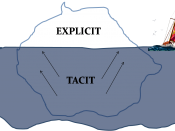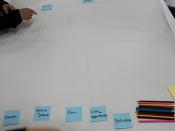Tacit knowledge
Tacit knowledge is seen from different angle as knowledge which is limited to self as oppose to explicit knowledge which according to Nonaka and Tekeuchi (1995) is "represented by artifact such as a document or a video which is created with the purpose of disseminating information to a wide spectrum of employees." According to kogal and Zander (1999), "they believe that organization can be conceptualized as a social community that specializes in the creation of and transfer of knowledge." Thus, this viable knowledge ultimately brings into light an organization's success and competitive advantage. The belief that knowledge may send a message of competition is troubling in that it stresses on the tacit and the community who are aware of element that is found in the people cannot be easily seen or proven. On the hand tacit knowledge notion represents a modern day experience and a substantial contribution to human resources and capital that enhances competition.
Stenberg (1997) suggest that, "human competencies depend on tacit knowlegde. He argues that tacit knowledge consists of that which is acquired on the job or in a specific situation or context." It goes without doubt that in practice, what knowledge-workers contribute and develop in an organization, such tacit knowledge is prevalent to an organization's culture and is found in its socialization process, routine and values. Anderson and Ostroff (1997), intimated that, "tacit knowledge develop through a process of social learning in which one's behaviors, attitudes and norms are transformed as time permits to accommodate both the person and the organization.
Knowledge comes from performing a task and prudently making a judgment in a given situation. Thus, knowledge is found in any workable situation. Nevertheless, what is workable is a question of one's perception and the power in which knowledge is measured cannot be...


